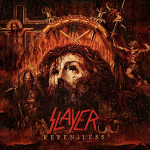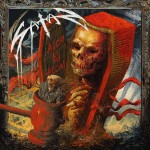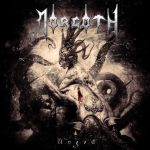Filed under: death metal, Heavy metal, internet and music, On reviewing, people | Tags: album reviews, Gamma ray, Mental reservation, metal archives, Rage, Repentless, Savage or Grace, Scanner, Seasons of the black, Sigh no more, Slayer
Getting angry at album reviews has been a past-time activity since my early teenage years. It is almost a masochistic fascination. I remember looking forward to reading the album reviews section on the Greek Metal Hammer, even though I knew that I was going to be pissed off. Over the years it became obvious to me that musical tastes are to a large extent subjective. Still that realisation did not stop me from getting angry at those reviewers who had a different opinion to mine. I eventually realised that the reason I would get angry was twofold. Firstly, I was angry with the fact that reviewers with a different opinion to mine received exposure by virtue of being in a mainstream magazine, which endowed them with the power to shape tastes. Secondly, I was angry because of the language they used. They would talk as if they stated an indisputable, objective fact, rather than a subjective opinion.
The times of print magazines and their monopoly in shaping public opinion are over. But the practice of authoritatively expressing opinions as if they were facts persists. The Metal Archives, also known as Encyclopaedia Metallum, is an amazing initiative and one I resort to almost daily. I mainly use it to look up connections between bands and information on discographies. But another feature of this resource is its album reviews written by registered users of the website. I almost never read those reviews, given that I know that I will disagree with the reviewers anyway. But from time to time I will come across an album rating (the average of all the ratings given by reviewers) that I will find so surprising that will make me want to read the reviewers’ rationale.
Recently I came across some terrible disparaging reviews of albums that I adore. Some of those reviewers are so deluded that they somehow think that they have cultural authority to judge what is good and what is bad. One of them had the nerve of telling the audience not to buy an album that the reviewer disliked! Here are five albums that I love but were reviewed in extremely unfair and ridiculous ways. As opposed to what I usually do, which is only giving my opinion on albums that I have carefully evaluated and discovered positive things about, I will respond to those reviews using their own disparaging language.
 1. Scanner – Mental reservation (62% on Metal Archives)
1. Scanner – Mental reservation (62% on Metal Archives)
One of the most obnoxious cases is Scanner’s absolute masterpiece from 1995, Mental reservation. This is an album that is clearly different from their first two albums. The latter were your average 1980s power metal albums, with awkward singers, and straightforward song structures sticking for most of the time to the popular music canon. I still like those albums, but comparing them to masterpieces like Mental reservation or Ball of the damned (1997) would be a crime. The album in question is amongst the best albums ever recorded. Leo Szpigiel is one of the most exciting singers in the German power metal scene, a truly genius singer and composer. The song structures are rarely straightforward. Each song has mood changes, beautiful chord progressions as well as verse-bridge-chorus progressions, musical intervals, perfect and more riffs that entire albums by other bands. Axel’s riffing is on an all time high on this album (listen to the mouth-watering verse-riff on “Upright liar“, or the triplet goodness of “Rubberman“). Each song has an awesomely crafted and memorable chorus. The lyrics and the story are beautiful. I cannot believe how anyone could listen to this album and not fall in love with it. There’s no point picking out favorite songs because each single song is a remarkable masterpiece. 100%
 2. Sinister – Savage or grace (55% on Metal Archives)
2. Sinister – Savage or grace (55% on Metal Archives)
The problem with some ratings on Metal Archives is that even if certain reviewers have actually made an effort to do a decent review of an album, a number (I’m using the word “number” here as in “I am not a number, I’m a free man”) might come along and destroy the overall rating. This is the case with Sinister’s Savage or grace. The horrid 55% rating is due to one reviewer who gave the album a 5%. Now, this reviewer admits that this was the first Sinister album they had ever heard. If that is the case why rush to publish an utterly rubbish review? Why judge a band whose history or style you are completely unaware of? I think it would be much more interesting if people shared their opinions about albums they make an effort to understand. I would not review a recent Arch Enemy album because I stopped following them 20 years ago, and I know that they play a type of music I haven’t made an effort to understand. I would not review a Nightwish album either, because they play a type of music I haven’t bothered with, so it is likely that I will not appreciate what they have to offer. So, the reviewer of Savage or grace should not have bothered writing a bunch of crap about Aad, Rachel, and one of the most genius guitarists in the planet, Ron van de Polder, who composed this album. An album that indeed suffers from a poor production, but every single song is a small orgasmic masterpiece. More vile reviews have been written about two other masterpieces by Sinister, Aggressive measures (1998) and Creative killings (2001), but I’ll get to that another time. 94%
 3. Gamma Ray – Sign no more (63% on Metal Archives)
3. Gamma Ray – Sign no more (63% on Metal Archives)
Gamma Ray’s Sigh no more might be my all-time favourite album by them. It is their last album featuring genius (and greatly missed from other GR releases) bassist Uwe Wessel, who wrote or co-wrote some of the best songs in Gamma Ray’s career, including “Changes“, “Start running” and “The spirit“. It is also the only album featuring the talents of Uli Kusch, a truly awesome drummer and arranger (listen to some awesome chops on “As time goes by“). This is one of the last power metal albums where the genre was going forward with new fresh ideas. Scheepers is giving some of his best performances ever. The first reviewer on top at least explicitly mentions her/his standpoint; s/he learned about Gamma Ray through No world order, an album I cannot listen to even if someone paid me. It makes sense if someone likes that version of Gamma Ray to not necessarily like the old Gamma Ray. But don’t fucking characterise their old masterpieces as “weak and overblown” for fucks sake! Another heavy metal authority who also likes No world order (my condolences) gave the album a 15%. Another reviewer who gave the album a 34% has some extremely laughable opinions (presented as facts) about the album’s “constant rock beat”, “laughable lyrics” and, last but not least, the profound “there is little value whatsoever here”. To use the same kind of eloquent language, this album is fucken awesome! 93%
 4. Slayer – Repentless (48% on Metal Archives)
4. Slayer – Repentless (48% on Metal Archives)
Slayer is a band famous for many things, including having some of the most fanatic and committed non-admirers. I can understand why someone might feel the need to slag off a band that is almost universally admired and recognised for its contributions to popular music. A band held to such high regard might be a bit too much for someone who does not agree with this recognition, who thinks that the band in question does not deserve it. Of course, that does not make the person in question any less a whinny little brat. If you don’t like a band just do what the rest of us do and don’t listen to it. The second reviewer gave the album a 30% had the nerve of admitting that s/he “listened to this thing twice full though”. An album that has taken a band ages to put together can surely be appreciated after two “full through” listens. What a number. Anyway, I am not going to repeat how much and why I liked this album, you can read my review here. Slayer are gods, they have over the years mastered the art of song-writing, and they became famous for their ability to compose songs like they do. In this album, Jeff or no Jeff, they did the same. 92%
 5. Rage – Seasons of the black (69% on Metal Archives)
5. Rage – Seasons of the black (69% on Metal Archives)
Rage’s new album is a great example of what is wrong with some of these reviews. The album just came out, yet a bunch of people, without taking some time to listen to the album a few times, re-evaluate their initial response, allow themselves to discover new things, rushed into making a negative judgement in a public platform. What gets to me is how some people, with regard to Rage, seem to completely ignore the band’s rich history and take as a given that Smolski was the best thing that happened to Rage. To these people I have to say that there was a worldwide following in the late 1980s and 1990s that loved Rage and who don’t give a shit about Smolski and his self-involved guitar playing and deaf-tone “melodies”. With regard to Rage’s new album, which I’ve been listening to non-stop for a month now, I have to say that it is almost perfect. Beautiful choruses, awesome riffs, awesome drumming, mindbogglingly beautiful melodies and song-structures. It’s an album full of catchy, inventive songs, and this is what old-school Rage fans like. 90%
Filed under: Best of the year, death metal, Heavy metal | Tags: Apex predator/Easy meat, Atom by atom, Beyond the red mirror, black trip, Blind Guardian, Enforcer, From beyond, Iron Maiden, Morgoth, napalm death, paradise lost, Repentless, Satan, Scanner, Shadowline, Slayer, The book of souls, The judgement, The plague within, Ungod
The end of 2015 is closing in, so this is the time to review some of the awesome music released over the last 12 months. The year 2014 felt like an excellent year in music, with Morbus Chron releasing an unprecedented death metal masterpiece, Ratos De Porao releasing what might be the best album in their immaculate career, and At The Gates returning to the grave with a pretty awesome album, among the highlights. What makes 2015 a bit different, in my opinion, is firstly that some of metal’s authorities released a new album, including Iron Maiden, Slayer, and Blind Guardian, and secondly that awesome death metal albums were almost totally absent.
Before I get on with my appraisal for 2015 I want to explain what I mean by “favourite music” in these posts. I do not claim that particular albums are objectively good, but rather that there are albums that I cannot stop listening to, either because they are wildly entertaining or because they are “cultivating”. So, it is primarily one quantitative criterion that determines which albums will end up on this list every year, that is, endurance: how much I have listened to an album, and whether I see myself continuing to enjoy it in the future. This might be happening either because particular albums might challenge (my) musical preconceptions, urging me to keep listening to them to discover new things, or because they are entertaining in a forthcoming way that caters to my own subjective preferences and expectations.
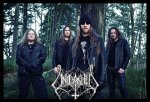 Starting with the albums I liked less, I will have to start with Unleashed‘s Dawn of the nine. The last album that I liked by Unleashed was Hammer battalion (although I would not compare it to the first four albums not even as a joke). Since then the band under the influence of Fredrik has evolved into a blackened-death band which does not appeal to me anymore. Having said that, I could actually listen to the new album, whereas I found impossible to listen to the previous two. “Land of the thousand lakes”, “The bolt thrower”, “Let the hammer fly”, and “A new day will rise” are among the few songs that I liked. I actually find it difficult to explain why I don’t like Unleashed’s new album; I just don’t feel like listening to these songs again after I have listened to them for a couple of times. Ghost is a band that I keep going back to every time they release a new album, hoping that it will be something that I like. The reason why I still try to listen to them is because I recognise that they have a somewhat unique sound, which make them interesting. Still cannot get into them
Starting with the albums I liked less, I will have to start with Unleashed‘s Dawn of the nine. The last album that I liked by Unleashed was Hammer battalion (although I would not compare it to the first four albums not even as a joke). Since then the band under the influence of Fredrik has evolved into a blackened-death band which does not appeal to me anymore. Having said that, I could actually listen to the new album, whereas I found impossible to listen to the previous two. “Land of the thousand lakes”, “The bolt thrower”, “Let the hammer fly”, and “A new day will rise” are among the few songs that I liked. I actually find it difficult to explain why I don’t like Unleashed’s new album; I just don’t feel like listening to these songs again after I have listened to them for a couple of times. Ghost is a band that I keep going back to every time they release a new album, hoping that it will be something that I like. The reason why I still try to listen to them is because I recognise that they have a somewhat unique sound, which make them interesting. Still cannot get into them 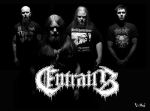 though. Entrails is a Swedish band that I never paid too much attention too. I listened to their two previous albums on YouTube when they came out and I thought that they were another one of the imitators of the real awesome old-school Swedish death bands, full of dull tremolo-picked riffs played just for the sake of tremolo-picking. I think the same thing about their new album, nevertheless, I did enjoy a few songs on it. “Epitome of death“, for example, kicks off with a really beautiful melody, moves on to a nice Revel-in-flesh-like groove and a cool chorus, and ends with an amazing, simply brilliant, melody! The song “Obliterate” kicks off with a nice grim melody which then leads to a riff that could easily be on Dismember’s Massive killing capacity album. So, I do like it, but how many times can one hear imitations of “Revel in flesh” before it starts getting boring? A band I was excited about was the project of
though. Entrails is a Swedish band that I never paid too much attention too. I listened to their two previous albums on YouTube when they came out and I thought that they were another one of the imitators of the real awesome old-school Swedish death bands, full of dull tremolo-picked riffs played just for the sake of tremolo-picking. I think the same thing about their new album, nevertheless, I did enjoy a few songs on it. “Epitome of death“, for example, kicks off with a really beautiful melody, moves on to a nice Revel-in-flesh-like groove and a cool chorus, and ends with an amazing, simply brilliant, melody! The song “Obliterate” kicks off with a nice grim melody which then leads to a riff that could easily be on Dismember’s Massive killing capacity album. So, I do like it, but how many times can one hear imitations of “Revel in flesh” before it starts getting boring? A band I was excited about was the project of 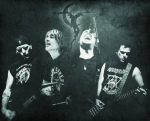 The Baron (Amebix) and Away (Voivod) called Tau Cross. Their debut album has variety and the depressing mood that characterises both Amebix and Voivod. For sure they are not scared to play around with the conventions of popular song-writing, with songs like “Hangman’s Hyll”, which is among the ones I like the most. More uptempo songs like “Stonecracker” reminded me a bit of Born Dead Icons. Overall, Tau Cross was what I expected, that is, a more metallic version of Amebix’s last album, but left me somewhat unimpressed. “We control the fear” sounds like it’s written by Trey Parker of South Park.
The Baron (Amebix) and Away (Voivod) called Tau Cross. Their debut album has variety and the depressing mood that characterises both Amebix and Voivod. For sure they are not scared to play around with the conventions of popular song-writing, with songs like “Hangman’s Hyll”, which is among the ones I like the most. More uptempo songs like “Stonecracker” reminded me a bit of Born Dead Icons. Overall, Tau Cross was what I expected, that is, a more metallic version of Amebix’s last album, but left me somewhat unimpressed. “We control the fear” sounds like it’s written by Trey Parker of South Park.
 The new Six Feet Under album (Crypt of the devil) is the next step in the evolution of the band after the loss of its identity that followed the departure of Butler and Gall and the introduction of short-lived line-ups and session musicians. Music-wise it is typical but good brutal American death metal, and includes some cool riffs and patterns. However, in my opinion, it lacks both the originality and the “chemistry” great albums are made off. Moreover, gradually since 2007 Barnes’ voice has been becoming monotonous and has lost its flexibility, and sometimes makes me feel like someone is scratching a board with a nail. The songs are good and I enjoy them, but as a whole this band has lost its distinctiveness. For those who did not like the classic SFU this is a good thing, and I have to agree that Death rituals was a snooze-fest. But, in my opinion, albums like Haunted, Maximum violence, or even Commandment cannot be topped by this new ensemble. Gruesome is a new
The new Six Feet Under album (Crypt of the devil) is the next step in the evolution of the band after the loss of its identity that followed the departure of Butler and Gall and the introduction of short-lived line-ups and session musicians. Music-wise it is typical but good brutal American death metal, and includes some cool riffs and patterns. However, in my opinion, it lacks both the originality and the “chemistry” great albums are made off. Moreover, gradually since 2007 Barnes’ voice has been becoming monotonous and has lost its flexibility, and sometimes makes me feel like someone is scratching a board with a nail. The songs are good and I enjoy them, but as a whole this band has lost its distinctiveness. For those who did not like the classic SFU this is a good thing, and I have to agree that Death rituals was a snooze-fest. But, in my opinion, albums like Haunted, Maximum violence, or even Commandment cannot be topped by this new ensemble. Gruesome is a new  super-group from the USA that pays homage to early Death. I first heard about them through Napalm Death’s Facebook page and I got really excited. The first song that I heard off their debut was “Savage land”, and it is without question the most accurate imitation of Leprosy-era Death I had ever heard. It turns out that all the songs are awkwardly similar to Death songs mainly of the Spiritual healing era, but also Leprosy and Human. The intro of “Gangrene” brings into mind “Flattening of emotions”. “Gruesome” starts in exactly the same way as “Spiritual healing”. This is a collection of very cool songs, played passionately (Gus Rios’ drumming is awesome!) but they feel a bit weird because they are so obvious rip-offs. It kind of feels like listening to Death’s Fate (1992) compilation album that
super-group from the USA that pays homage to early Death. I first heard about them through Napalm Death’s Facebook page and I got really excited. The first song that I heard off their debut was “Savage land”, and it is without question the most accurate imitation of Leprosy-era Death I had ever heard. It turns out that all the songs are awkwardly similar to Death songs mainly of the Spiritual healing era, but also Leprosy and Human. The intro of “Gangrene” brings into mind “Flattening of emotions”. “Gruesome” starts in exactly the same way as “Spiritual healing”. This is a collection of very cool songs, played passionately (Gus Rios’ drumming is awesome!) but they feel a bit weird because they are so obvious rip-offs. It kind of feels like listening to Death’s Fate (1992) compilation album that  contains songs from their first four albums. Nile‘s new album is brutal in the usual way, and their style is by default exciting, and I liked it as much as I have liked everything they have done since Black seeds of vengeance; that is, I enjoyed it but didn’t get super-excited. It is obvious that Dallas and Sanders are pushing themselves to their limits and their guitar playing has reached new unreachable heights. The band-members themselves have talked about the album in terms of it being less complicated than the previous one, and more “in your face”. Although this album indeed constitutes an extremely brutal attack, I did not think it is more straightforward than At the gates of Sethu. Songs like “Liber stellae rubeae” are striking in their complexity. The song “Evil to cast out all evil” is also a very complex song (its intro melody is quite similar to the respective melody of “Supreme humanism of megalomania” off At the gates of Sethu), as well as one of the most beautiful and complete songs in the album. The more straightforward and devastating songs, such as “Rape of black earth” and “Call to destruction” are also really good.
contains songs from their first four albums. Nile‘s new album is brutal in the usual way, and their style is by default exciting, and I liked it as much as I have liked everything they have done since Black seeds of vengeance; that is, I enjoyed it but didn’t get super-excited. It is obvious that Dallas and Sanders are pushing themselves to their limits and their guitar playing has reached new unreachable heights. The band-members themselves have talked about the album in terms of it being less complicated than the previous one, and more “in your face”. Although this album indeed constitutes an extremely brutal attack, I did not think it is more straightforward than At the gates of Sethu. Songs like “Liber stellae rubeae” are striking in their complexity. The song “Evil to cast out all evil” is also a very complex song (its intro melody is quite similar to the respective melody of “Supreme humanism of megalomania” off At the gates of Sethu), as well as one of the most beautiful and complete songs in the album. The more straightforward and devastating songs, such as “Rape of black earth” and “Call to destruction” are also really good.
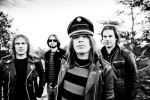 Some other albums that I enjoyed but did not make my top 10 list are the following: Imperial State Electric‘s new album (Honk Machine) is beautiful, as expected. I personally think it cannot be compared to any of their previous offerings, as I found it to be less varied and powerful, further emphasising their more pop inclinations. Nevertheless, some of the songs, including “Cold down here”, “All over my head“, “Another armageddon awaits”, and “Maybe you’re right”, proved to be beautifully addictive. David Ingram’s new band, Down among the dead men, came up with an album which is very enjoyable, albeit, in my opinion, quite repetitive. Exterminate! Annihilate! Destroy! is a mix of classic hardcore and death metal with Ingram’s trademark growls and hooky vocal patterns. Some of my favourite songs include “Unearthly child”, “Tooth and claw” and
Some other albums that I enjoyed but did not make my top 10 list are the following: Imperial State Electric‘s new album (Honk Machine) is beautiful, as expected. I personally think it cannot be compared to any of their previous offerings, as I found it to be less varied and powerful, further emphasising their more pop inclinations. Nevertheless, some of the songs, including “Cold down here”, “All over my head“, “Another armageddon awaits”, and “Maybe you’re right”, proved to be beautifully addictive. David Ingram’s new band, Down among the dead men, came up with an album which is very enjoyable, albeit, in my opinion, quite repetitive. Exterminate! Annihilate! Destroy! is a mix of classic hardcore and death metal with Ingram’s trademark growls and hooky vocal patterns. Some of my favourite songs include “Unearthly child”, “Tooth and claw” and 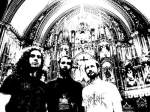 “The ambassadors of death“. Horrendous is another band whose debut album (The chills, 2012) drew heavily on Entombed’s first two albums. I thought it was an ok debut, which is more than I can say about their sophomore album which I found boring. Their new album titled Anareta is quite different from its predecessors, as it is more melodic and complex – but overall conventional – and quite pleasant. Similar riffs and arrangements can be found on some classic US prog death metal albums, such as Death’s The Sound of perseverance (1998) and Cynic’s Focus (1993), although Horrendous occasionally break into more furious brutal tremolo-picking, as on the songs “Polaris” and “Sum of all failures“. The rapid riffs and vocal patterns of “Acolytes” also bring into mind late 80s-early 90s Pestilence. As opposed to the aforementioned bands, however, Horrendous, in my opinion do not succeed, or maybe are not interested, in weaving all the different riffs/sections into coherent narratives. Still, this is a very good album with loads of things to be discovered. Tribulation‘s Children 0f the night monopolised my attention for a while and I still consider it a very good album. In my mind it sounds like the combination of Dark Tranquility’s Haven (2000), Septic Flesh’s Revolution DNA (1999), and Sentenced’s Frozen (1998). In other words, it is a very melancholic and melodic metal album, conforming to traditional Rock/metal structures, and, despite the growling vocals, I wouldn’t characterise it as extreme. Moreover, all the songs are slow/mid-paced and the melodies are similar, and even though I like the stylistic consistency and I was initially impressed, I got tired of it quite quickly.
“The ambassadors of death“. Horrendous is another band whose debut album (The chills, 2012) drew heavily on Entombed’s first two albums. I thought it was an ok debut, which is more than I can say about their sophomore album which I found boring. Their new album titled Anareta is quite different from its predecessors, as it is more melodic and complex – but overall conventional – and quite pleasant. Similar riffs and arrangements can be found on some classic US prog death metal albums, such as Death’s The Sound of perseverance (1998) and Cynic’s Focus (1993), although Horrendous occasionally break into more furious brutal tremolo-picking, as on the songs “Polaris” and “Sum of all failures“. The rapid riffs and vocal patterns of “Acolytes” also bring into mind late 80s-early 90s Pestilence. As opposed to the aforementioned bands, however, Horrendous, in my opinion do not succeed, or maybe are not interested, in weaving all the different riffs/sections into coherent narratives. Still, this is a very good album with loads of things to be discovered. Tribulation‘s Children 0f the night monopolised my attention for a while and I still consider it a very good album. In my mind it sounds like the combination of Dark Tranquility’s Haven (2000), Septic Flesh’s Revolution DNA (1999), and Sentenced’s Frozen (1998). In other words, it is a very melancholic and melodic metal album, conforming to traditional Rock/metal structures, and, despite the growling vocals, I wouldn’t characterise it as extreme. Moreover, all the songs are slow/mid-paced and the melodies are similar, and even though I like the stylistic consistency and I was initially impressed, I got tired of it quite quickly.
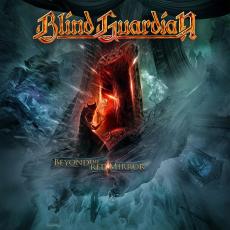 1. Blind Guardian – Beyond the red mirror
1. Blind Guardian – Beyond the red mirror
Beyond the red mirror is my favourite album from 2015 and there is only one serious contender to it (see next choice on the list). Comparing any band to Blind Guardian has become ridiculously meaningless over the years. The majority of heavy metal bands still seem to be stuck to the typical compositional canon of verse-chorus-verse. Comparing these bands to Blind Guardian is completely unfair since the latter abandoned this recipe as early as in the early 1990s. While Blind Guardian songs still have choruses and repeating themes, they cannot by any means be reduced to typical popular songs. The manner in which themes develop, constantly change, or are briefly interrupted by new melodies and themes, is breathtaking. The pleasure I can derive from each single song off Beyond the red mirror, exceeds pleasure derived from other bands’ entire albums. The album opens majestically with a choir performing a melody reminiscent of Orff’s Carmina Burana, setting the mood for the remainder of the album. “The ninth wave” is a great opener, but it is not by any means my favourite song on the album, as I find it a bit patchy and too orchestral for my taste. The following song “Twilight of the gods” is a beautiful song, the most conventional one in the album, full of amazing melodies, riffs and an awe-inspiring ending. “At the edge of time” is the song that strays the most from what Blind Guardian have done in the past, due to its theatrical/operatic character and the dominant role of the orchestra. It is a very different but magnificent song all the same. Overall, Hansi’s melodies are enchanting, and the riff-orchestration is magnificent. There are some razor-sharp riffs that would make death metal bands blush. There are some super heavy grooves and riffs that allude to the grandeur of Black Sabbath (such as the amazing rhythm guitars throughout “Sacred mind“). This band knows how to keep things interesting by slipping in short sentences (like on “Sacred mind” the phrase, “chance or predestined end”, near the end), explosive mood changing passages (such as “wake the witch who’ll be the brave one, don’t say what it’s like…etc.”, on “The holy grail“), or themes that offer resolution (such as the end of “Prophesies” – “But don’t be afraid, there’s more beyond the red door, but please ignore their pleas, just break the seal…etc.”).
There’s a couple of things that I dislike about this, otherwise perfect, album. Firstly, although some of the orchestral parts are amazing, like in “Grande parade”, a purely astounding song, in many other songs the orchestra seems to be consuming the electric instruments. Rhythm guitars are an essential element to Guardian’s sound and, in my opinion, they are too low in the mix. Most rhythm guitar parts in this album are astonishing, yet they are often buried under the orchestra and the drums. That’s a pity. Secondly, on their quest to create a flawless masterpiece I am afraid that Blind Guardian forgot to make an album that sounds “real”. I bet that the producer/band picked out the best version of any chorus and copy-pasted it from one section to the other (the most obvious example is the song “The throne”, an otherwise monumental masterpiece of epic proportions). While I understand that this might be common practice in the music industry, I would expect bands like Blind Guardian that respect themselves to refrain from it. Just because a section is repeated doesn’t mean it should be copied and pasted. I’m thinking of “Lionheart” from the album A twist in the myth, where small changes in the way Hansi sings the chorus, like that amazing trill he does with his voice the second time (on the word “easier”) adds to the song in such a big way. In any case, despite these minor hiccups, this is an astounding album.
Slayer’s new album is the only serious contender to Blind Guardian’s masterpiece. As a teenager, and like many other people around the world, I accepted Slayer as a unique band, as a band that is brilliant in ways other bands cannot even dream of. In recent years I came to realise that those elements that made me love Slayer back in the day are actually contested by many fans of heavy metal. For example, for some reason many heavy metal fans feel the need to express their dislike for Araya’s vocals and for Jeff’s and Kerry’s guitar-playing abilities. Those things have never been an issue for me; Araya’s vocals and Slayer’s guitar solos are two of the things that attracted me to them. I have also come to realise that most of those people who bash Slayer really enjoy criticising Kerry’s song-writing ability. Again that has never been an issue with me. I am not into Slayer just because of Jeff’s songs. Kerry-penned songs like “Piece by piece” , “Praise of death”, “Expendable youth”, “Temptation”, “Sex, murder, art”, “Circle of beliefs”, and so on, have been among my all time favourite Slayer songs.
Having said that, I have to admit that knowing that all songs but one on the new album were written by Kerry, I was a bit reserved. This is because part of the thing that made Slayer special was the juxtaposition of Jeff’s to Kerry’s style. My expectations were a bit lower than they would usually be. This does not mean that because it is one of my favourite bands I don’t have high expectations. Whenever I listen to a new album by an established band I ask myself the question, “If this were the album of a new band, not an established one that I am emotionally invested in, would I like it?”. The answer to this question with regard to “Repentless” is a resounding “yes”. After having listened to the new album literally hundreds of times I can say with certainty that I love it. I actually loved it from the first time I listened to it, and it makes me feel grateful for Slayer not breaking up after Jeff’s demise. Kerry really stepped up and offered some of his best songs yet. The stylistic homogeneity of the album is comforting and each song is beautifully crafted, loyal to the superior style that Slayer accomplished early on in their career. While some songs follow the traditional intro riff-verse-chorus formula (“Repentless”, “Cast the first stone”, “Atrocity vendor”), there are always variations that stir things up. On “Cast the first stone” (what a masterpiece!) after the second and third chorus an awesome trill-riff interrupts the normal flow, on top of Araya’s monumental voice screaming ‘When the war-cries echo, sacrifice is you’, and ‘On fields of blood you will pay’, respectively. The relentless beating on songs like “Repentless“, “Implode” and the excellently re-imagined “Atrocity vendor” are godly! The final section of “Implode” sends chills down my spine. The punky “You against you” (some excellent dissonant soloing on this one) is very refreshing and brilliantly captures the youthful mood of Undisputed attitude (1996). The dark/disturbing aesthetics of “When the stillness comes” – both musical and lyrical – is again unique; only Slayer can pull off such an awesome song. The way Tom sings the last verse is chilling, and the lyrics are the best on a killer-themed song since “213” in 1994 (Kerry has been ambivalent about who wrote the lyrics. Here he says he wrote them, while here he says Tom wrote them). “Piano wire”, one of Jeff’s final songs, is a song built around Jeff’s trademark dissonant chords, accompanied by Araya’s growling, semi-dazed voice, and a weird, unsettling chorus (the fast section with the solo sounds more like something Kerry would write). The musical narrative on songs like “Vices” and “Pride in prejudice” (the latter referring to police violence against African-Americans) is so compelling that, in my ears, are instant classics.
This is an album chock-full of awesome and catchy choruses, great song structures, and, in several occasions, really good lyrics. Kerry – as in Seasons in the abyss (1990), Divine intervention (1994), and Christ Illusion (2006) – is in top form. Tom deserves special mention as I think that he gives his best performance maybe since Seasons. On many songs I can actually hear him getting more pissed-off as the song advances! For instance, on “Atrocity vendor” by the time he sings the last chorus he is basically growling. For sure there are some minor repetitions here and there, for example the vocal pattern of “Repentless” is similar to the one in “Consfearacy”, but that’s somewhat typical for Slayer (remember how “Reborn”, off Reign in blood (1986), has the same vocal pattern as “Hell awaits”, or how “Praise of death” sounds a lot like “Necrophiliac”?). Overall, I consider this as a truly amazing album that I would not hesitate to characterise as a masterpiece. Slayer is a superior band, and by sticking to the style they invented and know best they casually created an album that stands out in the crowd of ever-expanding metal bands, many of whom are good but cannot even dream of creating something so unique and timeless.
The last time a power metal album appeared on my best-of list was 2010. This year, however, two power metal albums unequivocally crept their way into my best-of list. Scanner is another German heavy metal band that I have always loved, and they happened to release a new album in this great for German power metal year. While Scanner started about the same time as Blind Guardian – and in the mid-90s they were even compared to them – they always had their own identity that stands out among their peers. Unfortunately, I don’t have the words to describe what this identity consists of. I would say that Axel’s writing style is unique and that I would be able to identify it any time, but I cannot explain why. I guess it has something to do with the darkness his music evokes; lots of minor chord progressions and heavier riffs than most power metal bands. At any rate, Ball of the damned (1996) and Mental reservation (1994) are up there with the two Keeper albums (1987; 1988), Missing link (1993) and Perfect man (1988) and most Blind Guardian albums. While Blind Guardian evolved into something that can hardly be compared to their late 80s-early 90s days, The judgement could have easily been released during that period. All songs can be characterised as traditional heavy/power metal songs, with Scanner’s uniquely imaginative trademark sound. I find the new singer to be a particularly interesting case. At times I find his singing style too simplistic and, hence, unfitting for the leading role of singers in power metal bands. For example on the song “F.T.B” his singing is quite monotonous and dry and reminds me a lot of Casey Royer of D.I. on songs like “Pervert nurse”. However, at other times I feel that he might be a genius. His performance on songs like “Eutopia“, “Known better“, “Battle of Poseidon” or “Legionary” is astounding, and those high-pitched screams are just insane! The album opens with an awesome intro that is reminiscent of the Halloween theme tune by John Carpenter. There’s not much I can say about the rest of the songs, other than they are all instantly classic power metal masterpieces. Axel has easily come up with some of his best riffs and melodies yet. Listening to the opening riff of “Eutopia” and the beautiful mellow instrumental part half-way through (so classy!), the brutal rhythm section of “Known better” and the brilliant chorus, the background melody on the verses of “Nevermore”, I get chills down my spine. A classic album. Favourite songs: “Known better”, “Nevermore”, “Battle of Poseidon”, “Eutopia”, “The race”, “Legionary”.
 4. Paradise Lost – The plague within
4. Paradise Lost – The plague within
It’s been three years since the last masterpiece by Paradise Lost. Over the last decade Paradise Lost has established itself as one of my three all time favourite bands (alongside Napalm Death and Blind Guardian), and with good reason. Paradise Lost belongs to that under-populated category of bands whose new material stands proudly to its early masterpieces. The band’s last three albums are reminiscent of the brilliant Icon (1993) and Draconian times (1995). The new album explores the more dissonant melodies and depressing mood originally found in Shades of god (1992). Mackintosh proves once more that he is one of the most important contemporary musicians. Compositions such as the Baroquesque “Beneath broken earth”, a masterfully crafted death-doom hymn, challenge popular notions of melody and composition in the metal genre. The tapped melody on the chorus of “Victim of the past” sends chills down my spine. The structure and melodies of “An eternity of lies” are breath-taking. Holmes revisits his growling vocals, something he hasn’t done since 1992, which prevail throughout the album. I personally think that either the band or the producer consciously decided to not overproduce Holmes’ vocals, hence keeping them more true to his abilities and his live performance. That’s a good thing because for almost two decades now his live performance pales in comparison to the studio “performance”. Finally, I have to confess that each time a new PL album comes out I can’t help but think how much better it would have sounded if Matthew Archer played the drums. This doesn’t mean that Adrian is not good, but rather that I prefer Matthew’s style for Paradise Lost. Favourite songs: “Beneath broken earth”, “Victim of the past”, “An eternity of lies”, “Terminal” (what a chorus!!!), “Return to the sun“, “Sacrifice the flame”.
I initially thought that Enforcer’s new album is much better than Death by fire (2013) but not as good as the brilliant Diamonds (2010). I now think that it is equally good – if not better – to Diamonds, despite lacking an obvious stand-out masterpiece like “Katana”. The style is closer to Diamonds, as the balance tips towards mid-tempo songs, with only two fast songs, the instant classic “Destroyer”, and the unrelenting “Hell will follow” (reminiscent of the early German speed metal of Avenger), which has an amazingly furious instrumental change half-way through, as well as three other up-tempo songs, “Banshee”, “Farewell” and the Axel Rudy Pell-ish “One with fire“. “Farewell” is a masterpiece, and probably my favourite song on the album. It is driven by a pull-off riff slightly reminiscent of Maiden’s “Flash of the blade”, and a hook on the chorus which is simply fantastic. Enforcer continue the tradition of reserving the 6th spot in the playlist for an awesome instrumental song that pays tribute to Iron Maiden (on songs like “Genghis Khan”) and Satan (on songs like “The ritual”). The melancholic mood and vocals in the melancholic but powerful “Below the slumber” are a bit reminiscent of Crimson Glory. Part of the verse vocal melody of “From beyond” is a rip-off of “The final countdown” by Europe, but the rest of the song is totally different; a very memorable and awesome song. I urge everyone who loves the classic NWOBHM sound (awesome twin-guitar melodies and beautiful solos) mixed with some German influences (fast sharp riffs and screaming vocals) to get this album.
The second album by the new Swedish heavy metal gods Black Trip is awesome. I don’t think I will ever like it as much as their debut which is one of the best heavy metal debuts ever made, but I consider it to be a good successor. The main difference between the two albums is that Peter is not the sole composer this time around. Instead, Joseph contributes two songs (“Shadowline”, “The storm”) and a short instrumental, Jonas one song (“Berlin Model 32”), and Sebastian another one (“Scenery”). Sebastian’s song is a bit more rock-orientated, even reminiscent of Imperial State Electric. The listener of this beautiful album will be happy to encounter enchanting opening riffs that flirt with NWOBHM and British hard rock conventions, excellent twin-guitar solos and melodies, awesome vocals that are melodious yet powerful, and great musicianship overall. My favourite songs are “Over the worldly wall”, “Clockworks“, “Subvisual sleep”, “Shadowline”, and “Danger”.
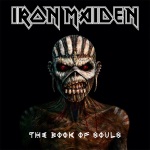 7. Iron Maiden – The book of souls
7. Iron Maiden – The book of souls
I haven’t been so excited about a Maiden album since The X factor (1995), which I adore to this day. While I thought that all the albums since Bruce and Adrian’s return had some awesome songs worthy of the Maiden legacy, I also thought that most songs were boring. For one thing, Adrian took over as a composer and Steve’s input decreased considerably. I thought that Dance of death (2003) had many excellent songs, mainly those written by Gers and Murray, and that A matter of life and death (2006) was overall really good, albeit unexciting (with the exception of the standout “The pilgrim”). In my opinion, the new album goes down a different path to the one Maiden have been going down for many years now. The band pulls off some gems that hint to the glory days of the 1980s. The album opens in a majestic way with Dickinson’s “If eternity should fail”, a song full of great vocal-melodies, a big chorus, a fast mid-section with a catchy guitar harmony, and an epic ending. I haven’t heard such a good beginning on a Maiden album since The X factor (1995). I am quite happy that they have abandoned the cringy radio-friendly, supposedly “hit” short songs that opened their albums between Virtual XI (1998) and A matter of life and death (2006). The eponymous song is an epic masterpiece crafted by Gers and Harris, with a super heavy main riff, brilliant melody on the chorus, and an amazing faster-paced change. Dickinson’s performance brings it to new heights. This song reminds me of the Maiden of my youth, when I thought that they were they best band in the planet. An awesome song like “Tears of a clown” manifests a band capable of fashioning typical, old-school heavy metal tunes that bring into mind the No prayer for the dying (1990) and Fear of the dark (1992) period (ironically it is partially written by Smith). “Death or glory” is similarly an old-school heavy metal song with amazing vocal melodies and memorable riffs. “The red and the black” is along with the eponymous song an absolute masterpiece written in the unconventional melody lines that plague Steve Harris’ mind for 40 years now. The twin guitar melodies in the end of the song are pure brilliance! “When the river runs deep” starts off with a riff whose fury is reminiscent of something Smith would have written in the mid-80s. Overall, I consider it a very enjoyable album that reminds us that Maiden is the best heavy metal band that has ever been. As it has been the case for many years now, the production sucks.
 8. Napalm Death – Apex predator/ Easy meat
8. Napalm Death – Apex predator/ Easy meat
Napalm Death’s new album is, to my ears, very similar to 2012’s Utilitarian. The main difference between these last two albums and those that were released between 2000 and 2009 is that the former have lots of songs that flirt with the pure noise conventions of grindcore, while the latter had much more thought-through and riff-orientated songs. Indeed Apex predator might be the noisiest album with which ND have ever come up. Most of Mitch’s songs are characterised by the typical cross-over style strumming and beat, with the exception of the hyper-fast “Stunt your growth”, the slow and agonising “Dear slum landlord”, and the slightly groovier “Timeless flogging”. Embury provides the cuts that, in my opinion, stand-out more such as “Hierarchies“, “Cesspits” and “How the years condemn“. All in all, ND once more maintain high levels of healthy aggression and offer some pretty diverse and exciting songwriting.
Satan can make both its contemporaries (e.g. Iron Maiden) and the young bands of the new wave of old heavy metal alike blush! Bands like Maiden still write awesome songs but they have completely lost their edge and energy, and newcomers like Enforcer, lack the sophistication of old bands that know their craft. Satan is both energetic and powerful, and sophisticated. The new album is beautiful. The riffs and arrangements bring to mind great moments in metal history such as Megadeth‘s Rust in peace (1990, which was influenced by Satan in the first place!) or Mercyful Fate. The riffing is the highlight of this album. The songs are riff driven, rather than melody driven. Indeed, sometimes the vocal lines feel kind of monotonous and some songs sound like instrumentals for which the vocals was an afterthought (the vocals reminded me of Germany’s Paradox from time to time). The music is nevertheless fascinating, and lots of the vocal melodies are also beautiful and add an extra layer of awesomeness (such as on the eponymous song). Favourite songs: “Atom by atom”, “Ahriman”, “The devil’s infantry“.
I found Morgoth’s new album to be very good, albeit a bit monotonous; the first couple of times I listened to it, it felt a bit like it was composed off one long song with minor variations. It took a few listens to appreciate its subtle beauty. This album is often reminiscent of the more atmospheric moments of Odium (1993), and at times offers the raw brutality of Cursed (1991). Songs like “Voice of slumber“, “Snakestate” and “God is evil” are hard to find these days and make my skin crawl with sweet nostalgia. The beginning of “Snakestate” is like it came straight out of Odium. “Black enemy”‘ has one of the most memorable choruses that Morgoth have written, and they sure have their share of memorable choruses. The same song is a perfect example of Morgoth’s unique style of building tension that is eventually released through a fast two-beat (kick-snare) drum pattern. While the overall sound is loyal to Morgoth’s trademark style of slow and agonising tremolo-picking, reminiscent of Death‘s “Pull the plug” (the pre-chorus bit), there are also some new elements in their sound, such as the beautifully harmonised melody on the chorus of “Descent into hell”. Karsten Jager who replaced Marc Grewe – a genius vocalist who absolutely defined the brilliance of the old Morgoth albums, as well as Comecon’s third album – is doing a very good job imitating his predecessor. Lyricwise, one can find the usual death metal themes around murder, pain and suffering, but also hints of a critique of capitalist exploitation of the environment and the masses. Harald Busse’s lyrics particularly are very nice, and the rest of the lyrics are not bad either. Also, listening to the song “Nemesis” whilst reading Lovecraft’s chilling poem (not included in the lyric sheet, I imagine for copyright-related reasons) is pretty awesome. The cover artwork and general design are outstanding.
2015 PLAYLIST


